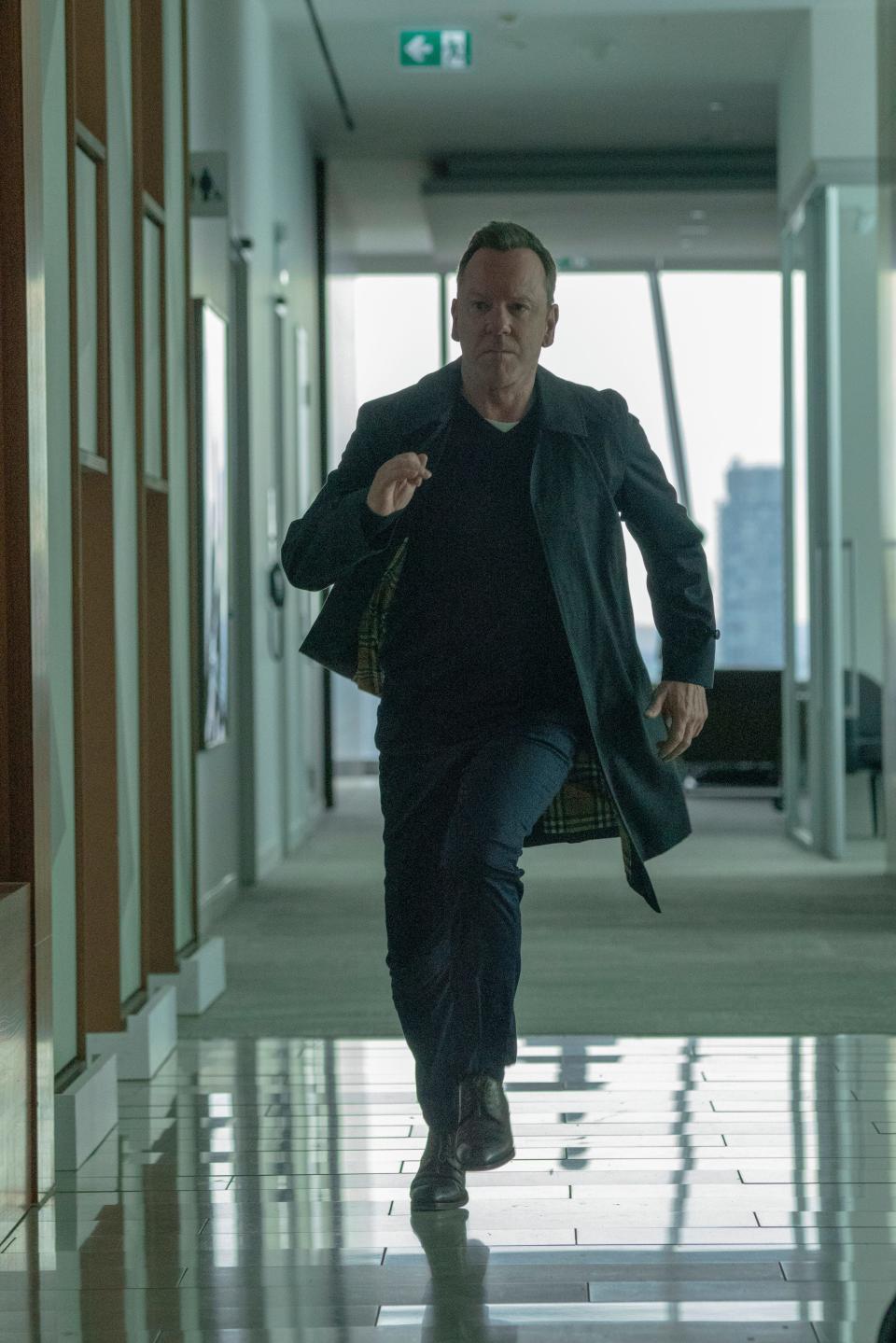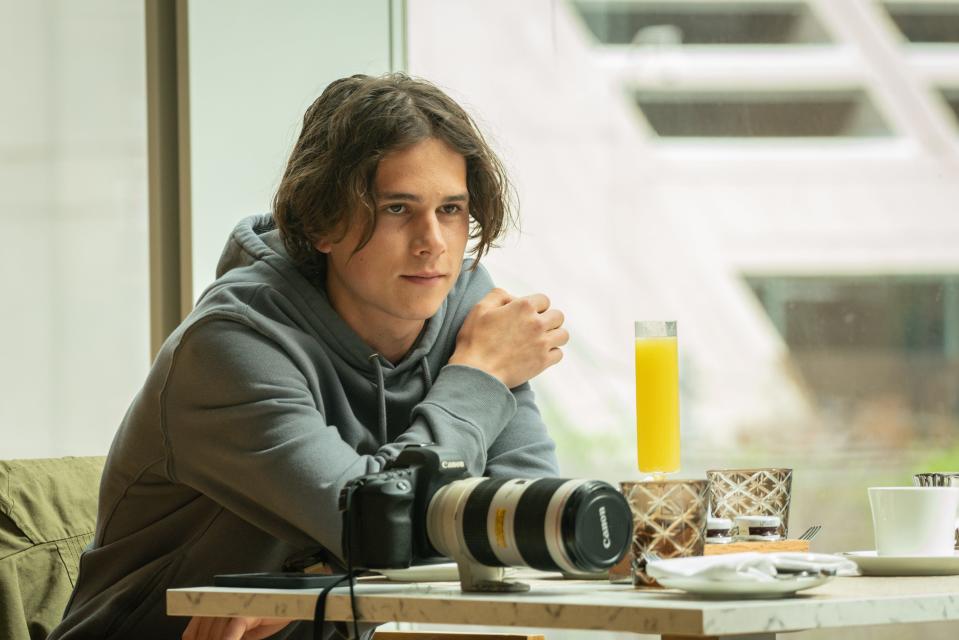Kiefer Sutherland on Jack Bauer, his singing career and going down the 'Rabbit Hole'
PASADENA, Calif. – Kiefer Sutherland went from young film star ("Stand By Me," "The Lost Boys," "Flatliners") to a successful TV career, led by the groundbreaking Fox thriller "24." He has played a fictional president in "Designated Survivor" and a real one – FDR – in last year's Showtime "The First Lady."
Along the way, the gravel-voiced actor found an unexpected side gig as an Americana-tinged country singer. And now comes his latest effort: "Rabbit Hole," a conspiracy thriller from Glenn Ficarra and John Requa ("This Is Us," "WeCrashed") about a corporate spy named John Weir who's framed for the murder of a government official. The eight-episode series premieres Sunday on Paramount+ (new episodes streaming weekly).
USA TODAY caught up with Sutherland, the son of actors Donald Sutherland and Shirley Douglas and dad to actress Sarah Sutherland ("Veep"), about the new show, what went wrong at "Designated" and whether "24" could return again. (Edited and condensed for clarity.)

Question: Why did you find John Weir a fascinating character to play?
Kiefer Sutherland: You're taking a guy who's in control of manipulating this situation and flipping that around. But is the character that I'm playing complicit or not? Is this a conspiracy against him, or am I working this conspiracy to draw other people out? And that was the hardest thing for me to play, because (producers) weren't upfront with me about where they thought they were going to land.
You've done a lot of movies, but most fans know you as Jack Bauer, and they'll want to know, is he like Jack?
They're not at all alike. (Jack) is completely driven by a sense of moral righteousness. John is the opposite: a manipulative, distrusting, disloyal guy. He's a con artist. So aside from the fact that two of them can run down the street, and they look a lot alike, they're very different.

Jack is always used to winning a fight, but in this show you get beaten up by a kid on a skateboard. How did that make you feel?
I loved reading it; I hated doing it. I used to love it on "24." I'd look up to the 6-foot-6 guys and go, "You’re going to lose this fight." And that was fun. What I didn't like with the kid, and it never happened with Jack Bauer, was waiting to get hit from behind. There is a lack of dignity. I was very happy when that was over.
When you left “24” the first time, you told me you felt like you were getting too old. You said you didn’t want to see Jack Bauer with a walker. Now here you are at 56, doing this kind of stuff again.
I run a lot; it's helped me stay in shape. So it's a question of pain management and what are you up for? When you stop doing it, you miss it, and then when you see how cool it can look, it feels really great. There's an adrenaline rush.
You've become a country music star. Where did that right turn in your career come from? And what makes it so rewarding?
Jude Cole, who is an extraordinary singer/songwriter, looked at me and said, "You can play, but you've got to start playing with other people." So we started playing a lot of shows, and Jude came and said, "Who wrote that song 'Walk Away'"? I said I did, and he said, "Really? I'd like to record that." And we recorded a few songs and I loved the way they sounded. And then I put together a band, and went out on the road, and I just didn't stop.
His musical playlist: What's Kiefer Sutherland listening to?
Is this something you'd like to pursue more on a full-time basis, or are you happier acting?
It's pretty full time. We're doing 30, 40, 50 shows with 15 people on a bus. I'm going back out in July to play a bunch of big festivals. We got to open for Muse; that was weird playing shows in front of 17,000, and then you go straight back to the bar with your normal group and that's about 1,000. I love writing the songs and I love playing them, and it's no more than that. I don't have some out-of-perspective dream, it's just something I really love doing.
Your last TV role was "Designated Survivor," as a reluctant president who got the job after an assassination. What did you think of the way that whole series played out on ABC and Netflix? It wasn't what I expected it to turn into.
It wasn't either, for me. I really loved that character, but I thought it was going to be much more like a "West Wing"-type show. And "West Wing" is really hard to write, and Aaron Sorkin's Aaron Sorkin, and that is not a reflection on the creator of (my) show. I was disappointed by it. And even if there were people that I didn't see eye to eye with on it, I think everybody wanted to do something great. Sometimes good intentions don't translate. Everybody tried to make what they thought was the best show and at times their wheels were just too wide and would rub on a fender.
Do you think "24" could exist in a new form today, and what would need to change?
Yeah, absolutely. And nothing. The idea, the premise of "24" is the star, and if you've got 16 iterations of "Star Trek," how can you not have two iterations of "24"? The beauty of it is obviously the clock and the day, which just makes it so much harder to produce. You could have each season be a different person: One could be a firefighter, one could be a babysitter, one could be a cop.
Would you do it?
Not that iteration. I've always told them that I would if it made sense, and even if it was just a little part. It's going to require a monumental effort to grind out the 24 episodes required for a season.
This article originally appeared on USA TODAY: Kiefer Sutherland: '24' agent to country singer and 'Rabbit Hole'

 Yahoo Movies
Yahoo Movies 
